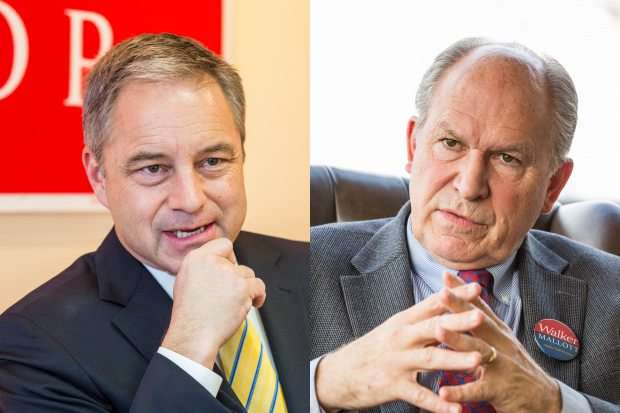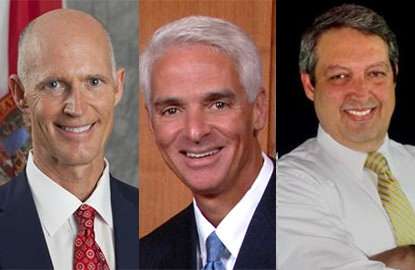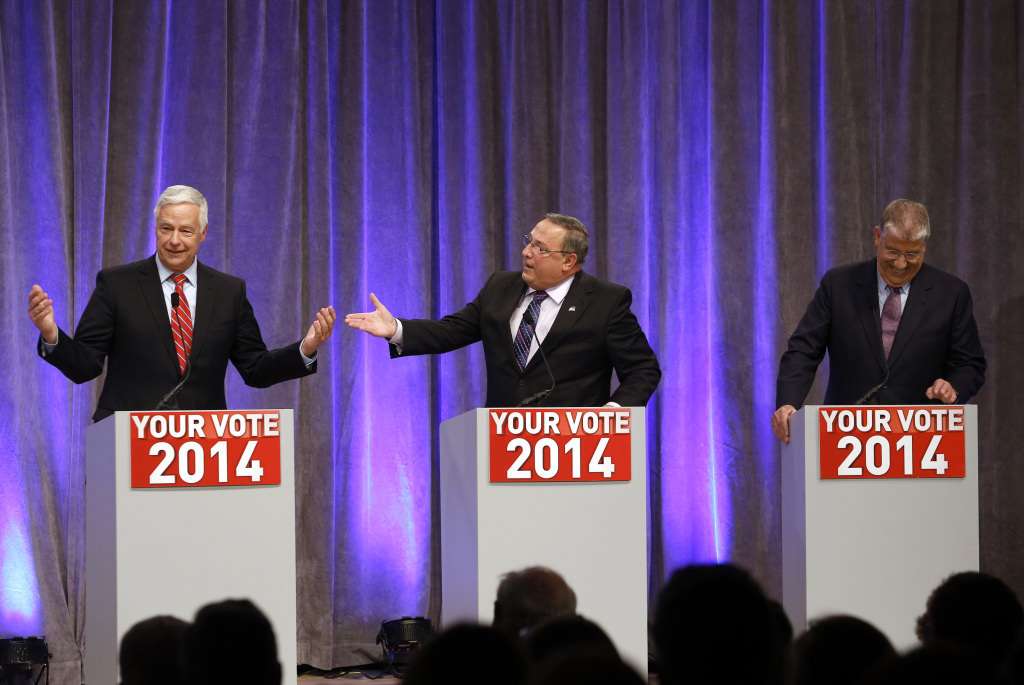Independent Candidates Shake Up 2014 Governor Races
In tomorrow's midterms, third-party candidates are shaking up key governors races in Alaska, Florida, and Maine. Independent and libertarian candidates have managed to peel off both conventional Democratic and Republican voters leaving major party candidates scrambling to appeal to the independent-minded.
Odd things happen when third party candidates enter a competitive race. Examining Alaska, Florida, and Maine we find tea party favorite and former Alaska Gov. Sarah Palin endorsing a Democrat and Independent, tea party-backed candidates courting the support of so-called establishment Republicans, Democrats supporting a social conservative and Republicans nearly criticizing them for doing so.
Here are the key governor races with influential third party candidates to watch tomorrow:
Alaska

The Alaska governor's race has taken an unconventional turn with Democratic candidate Bryon Mallott dropping out to the race to form a "unity ticket" with socially conservative Independent candidate Bill Walker, Democrats then supporting a social conservative, and Republicans criticizing them for it.
The incumbent Republican governor Sean Parnell was the expected front-runner until the third-party candidate teamed up with the Democrat. Parnell has also had difficulty with voters for several reasons. First, as governor he has run up deficits, dipped into the state reserves, refused to accept Medicaid expansion, and some believe he has mishandled the Alaska National Guard sexual assault case. In addition, voters perceive Parnell to have doled out special favors to oil and gas special interests, leading former Republican Gov. Sarah Palin to endorse the Walker-Mallott ticket saying Republican Parnell was "suckered" by "crony capitalists." The political dynamics of the race are all over the board. Along with Sarah Palin's endorsement, Walker-Mallott also received the AFL-CIO's endorsement.
Independent Bill Walker used to be a Republican, remains socially conservative, and is a deficit hawk promising to cut spending and raise taxes on somebody to balance the budget. So this put Democrats in a curious position of supporting a social conservative in order to break into Alaska's Republican-dominated state house. Moreover, Republicans find themselves walking the fine line of pointing out Walker's stances on abortion and gay marriage to Democrats without offending socially conservative Parnell voters.
Florida
In Florida a former and current governor are in a tight race tomorrow, with enough irritated voters that the libertarian candidate pulls about 7 percent of the likely vote. Polls show former governor Republican-turned-Democrat Charlie Crist with an average of 42 percent of the vote, incumbent Republican Rick Scott with 41.2 percent and libertarian candidate Adrian Wyllie with 7 percent.

Voters are disillusioned with both candidates, perhaps because neither can claim outsider status having both filled the office before. Moreover, both Scott and Crist are underwater on their favorables (Scott 48 to 41, Crist 47 to 40). Consequently, the race has considerably more undecided voters than usual. Political Science Professor Susan MacManus argues that ultimately voters will decide the Florida governor's race based not on whom they like, but whom they dislike less.
While undecided voters and independents tend to tilt toward Crist in this race, libertarian candidate Wyllie pulls voters from both Crist and Scott, although slightly more from Scott. For instance, a St. Leo University poll finds Crist with 43 percent, Scott with 40 percent, and Adrian Wyllie with 8 percent. However, if no libertarian candidate were in the race, Scott would receive a 5-point bump and Crist a 2-point bump, tying at 45 percent each. Interestingly, while Scott struggles with a major gender gap (35% to Crist's 50%) men and women are equally likely to support the libertarian (about 7%). White and Hispanic Americans are also equally likely to support the libertarian (9 percent). Young people (14%) are twice as likely as those over 40 (7%) to favor Wyllie. However, with Wyllie out of the race, most of these younger voters choose Scott over Crist.
Rick Scott was initially swept into power riding the 2010 tea party wave, and has managed to keep grassroots conservatives only marginally pleased with his tenure. In contrast to the several toss up senate races, Scott has not enlisted the help of tea party favorites like Sen. Ted Cruz and former Alaska Gov. Sarah Palin. Instead, he has sought the support of Louisiana Gov. Bobby Jindal, New Jersey Gov. Chris Christie, former Florida Gov. Jeb Bush, and Texas Gov. Rick Perry, indicating he's trying to reach more moderate voters.
Charlie Crist has sought the help of Vice President Joe Biden on the campaign trail, and Rev. Al Sharpton and Rev. Jesse Jackson signaling his attempt to turn out more left-of-center voters.
Maine

Unlike most other races with third-party candidates, Maine's independent candidate Eliot Cutler is siphoning off votes primarily from Democratic Rep. Mike Michaud, who is in an extremely tight race with Republican incumbent Paul LePage. Real Clear Politics shows LePage with an average of 41.2 percent, Michaud with 39.8 percent, and Cutler with 12.3 percent.
Rather than having distinct issue positions, Cutler's views tend to align with the Democratic candidate Michaud, however he's proven himself a formidable campaigner and debater. Cutler is socially liberal, supports universal health care and college education, campaign finance reform, and repealing "outdated" regulations. Indeed, polls have found that on average, 64 percent of Cutler voters would pick Michaud as their second choice, and 36 percent would pick LaPage.
In efforts to win back some of these potential Michaud voters, Maine Democrats have sought to point out how Cutler is not liberal enough on public sector unions, taxes, the minimum wage, and criticized him for calling free college tuition a "gift." Michaud has brought in Democratic heavy weights, such as President Bill Clinton as well as President Barack Obama and Michelle Obama in order to court Cutler voters.
Without gaining serious traction in the polls, Cutler held a press conference last week telling his supporters to vote for someone else if they don't think he can win. This prompted Independent Sen. Angus King to shift his support to Democratic candidate Michaud.
Key Takeaway
Third party candidates in tight governors races reveal that such candidates can peel off voters from both Democratic and Republican mainstream candidates. In the last minute scramble to pick up swing voters and re-capture third party voters, partisan activists resort to crossing party lines and positions in efforts to win.
Editor's Note: As of February 29, 2024, commenting privileges on reason.com posts are limited to Reason Plus subscribers. Past commenters are grandfathered in for a temporary period. Subscribe here to preserve your ability to comment. Your Reason Plus subscription also gives you an ad-free version of reason.com, along with full access to the digital edition and archives of Reason magazine. We request that comments be civil and on-topic. We do not moderate or assume any responsibility for comments, which are owned by the readers who post them. Comments do not represent the views of reason.com or Reason Foundation. We reserve the right to delete any comment and ban commenters for any reason at any time. Comments may only be edited within 5 minutes of posting. Report abuses.
Please to post comments


Gee and nothing about California? Nobody got my vote; I suggested to everyone who asked that they vote for him.
Yeah! Free college is not a gift, it's a right!
~Progderp
Popehat ?@Popehat ? 30s31 seconds ago 1. Legally change name to "I Really Have To Vote For One Of These Assholes? Seriously?" 2. Run for multiple offices, win. 3. ???? 5. Profit
Fuckin' Popehat is teh awsum 🙂
Govnor Brownfinger is in trouble in Kansas.
No shit.
Don't worry, buttfuck, your beloved Dems are going to keep the Senate. The lady who never washes her hair said so.
Nope. Nate Silver said GOP takeover!
The fact that voters are only allowed to express a preference for one candidate ("yes" for one and "no" for everyone else) is a large part of the problem. It gives you the "spoiler" problem that shouldn't exist. Approval voting is far more preferable to the plurality system that's in place in most locations. I hope that in the future, some state passes an initiative mandating it for any election with just one winner.
Go Cutler! Siphon off those votes!